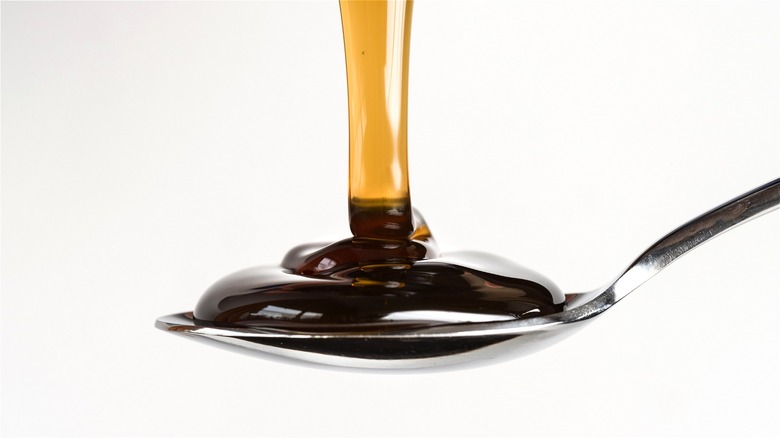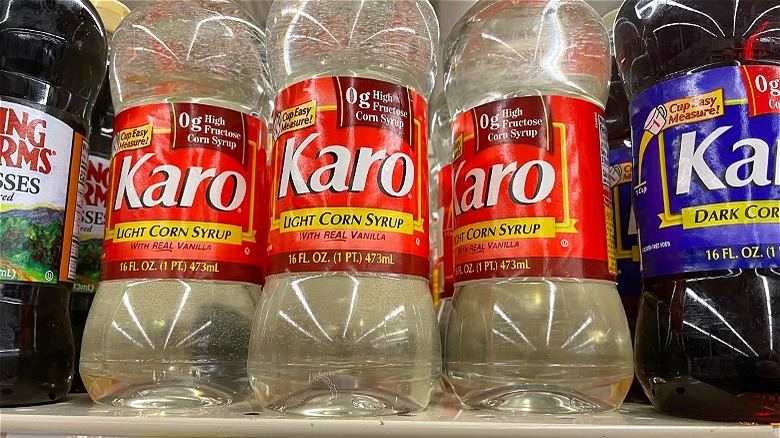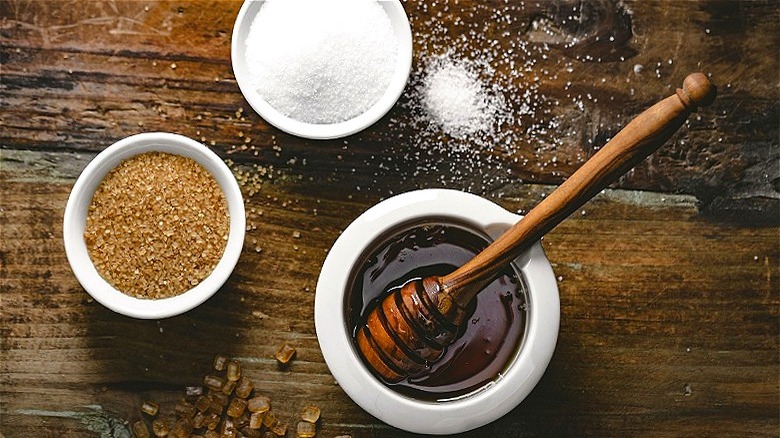Common Pantry Staples You Can Use To Substitute Corn Syrup
We may receive a commission on purchases made from links.
To claim that America's favorite homemade or store-bought confections contain a decent amount of sugar is usually a safe assumption. Whether you choose classic buttery pound cake or soft and chewy snickerdoodles, despite their sugar content, we all choose to indulge in our favorites from time to time. In fact, according to a 2017 trend report conducted by Technomic, 32% of over 1500 survey participants admitted to indulging in dessert after meals at least twice a week. Regarding home baking, Crumbl Cookies and OnePoll partnered to reveal that 82% of cookie lovers preferred to make their own cookies at home, via 72Point. With home baking being a popular way to satisfy your ever-present sweet tooth, the different varieties of sugar to choose from in present-day supermarkets can sometimes feel quite overwhelming. Beyond regular cane sugar, light and dark corn syrup is often a suggested ingredient for particular recipes. But what is corn syrup exactly?
Not to be confused with high-fructose corn syrup, according to King Arthur Baking Company, corn syrup is a liquid or "invert" sugar that stays in liquid form at varying temperatures. Corn syrup is often used to prevent sugar from hardening into clusters in recipes that require a smoother texture like fudge or caramel. Interestingly, many people turn to corn syrup substitutes for their favorite recipes.
Is corn syrup really that bad for you?
In uncovering more of the basics around corn syrup and how it's used, the author of "On Food and Cooking," Harold McGee defines corn syrup as the breakdown of corn-based starch molecules that have been treated with specific enzymes, per The Washington Post. This treatment changes the overall structure of the inner glucose in those corn-based starches, forming a syrup of sorts. As far as the common assumption that corn syrup may be worse for your health than cane sugar, Food Network claims light and dark corn syrup and table sugar are all considered refined sweeteners and should therefore, be consumed with care. As with any refined sweetener, you don't want to overdo your consumption, so checking nutrition labels and controlling your urge for second or third helpings of homemade desserts is essential.
Beyond playing a major role in maintaining that soft and chewy texture in your favorite candies, MasterClass notes that corn syrup is also used to create a silken feel to your favorite frozen treats or cream-based pies. King Arthur Baking Company notes that adding a small amount of corn syrup to your favorite cookie recipe can even create chewier cookies. Regardless of the many ways corn syrup can enhance your favorite baked goods, if you don't have any handy or want a healthier option, there are many corn syrup alternatives ready to fulfill your baking needs.
Convenient corn syrup alternatives
Before grabbing a corn syrup alternative, you need to look at why it's recommended in the first place. Apart from corn syrup's anti-crystalization properties, according to McGee, via The Washington Post, this unique invert sugar works to maintain adequate moisture levels in your favorite baked goods. While you may already be familiar with the eight ways you can replace sugar with raw honey, honey (as well as brown rice syrup) both have distinct flavor profiles so keep that in mind when using these alternatives.
If you're after a more neutral-tasting substitution, you can make your own simple syrup out of sugar and water or use tapioca syrup. Healthline also recommends stevia or molasses in certain recipes. Stevia is a naturally occurring sweetener that is calorie-free while molasses is rich in certain vitamins and its dark and rich consistency makes it a great alternative for recipes that call for dark corn syrup. There may not be one product that matches the taste and texture of corn syrup exactly, but there are plenty of tasty substitutes for this liquid sweetener right in your own pantry.


